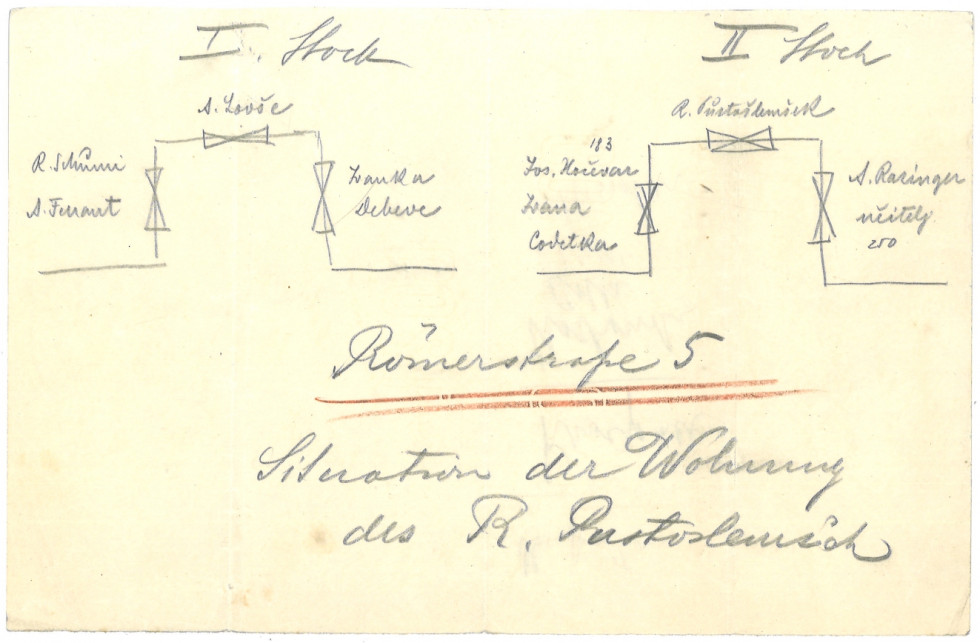-
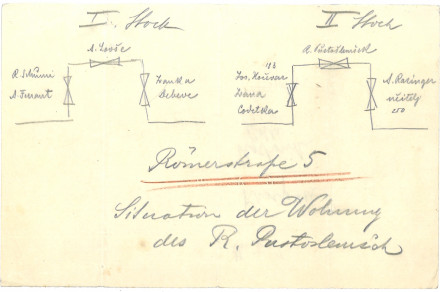
January 2023
Police Surveillance of Rasto Pustoslemšek, the Editor of the Newspaper Slovenski narod
Power that is running out of breath sees enemies everywhere. This was most certainly experienced by Rasto Pustoslemšek, the editor of the newspaper Slovenski narod, whose reports from Belgrade during the annexation crisis in 1908 and 1909 attracted the attention of the Austrian diplomats and spies. Although the police surveillance of the journalist did not produce any tanglible or conclusive evidence, Pustoslemšek's memoirs make it obvious that his anti-Austrian cooperation with the Serbian government was not completely far fetched.
-
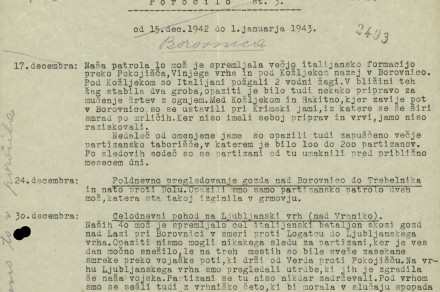
February 2023
The Report of the Village Guard in Borovnica for the Period Between December 15, 1942 and January 1, 1943
The two-page report of the commander of the village guard in Borovnica covers a period of just two weeks at the end of 1942 and the start of 1943. Although the famous Borovnica viaduct was still standing at that time, the inhabitants of the valley below still seemed to find themselves on different sides. However, the situation and relations were not as black and white as it may appear. This month's archivalia reveals the complexity of the events taking place eighty years ago, which we nowadays often tend to overloook.
-
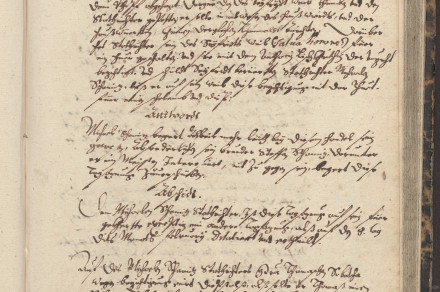
March 2023
Minutes of the Brežice Town Council Saved From a Shop Counter
A community of free inhabitants of the town of Brežice, through their elected representatives, exercised jurisdiction of the administrative and judicial authority on the territory of the town and its surroundings. However, it is solely thanks to the intelligence and soundness of judgement of one particular female resident of the town that the minutes of the town's council between 1585 and 1651, which are in fact the earliest records on the implementation of the town's autonomy, managed to escape from being destroyed forever. Presented here are some details from among the preserved records.
-

April 2023
Ski Race for the Yugoslav Championship in Planica near Rateče – the Film Debut of Veličan Bešter and His »Re-Birth«
Between February 21 and March 5, 2023, Planica was hosting FIS Nordic World Ski Championship, and in the first days of April, the valley below the Ponce mountain range was also the venue for the closing competitions of this year's Ski Jumping World Cup.
Ski competitions in Planica near Rateče have a very long tradition. This is clearly reflected in the film Ski Race for the Yugoslav Championship in Planica near Rateče, which was shot by a photographer and Slovenian film pioneer Veličan Bešter (1891-1938) on February 26, 1922. In addition to being of extraordinary importance both for the history of the Slovenian cinematography as well as for the history of the Slovenian sport, this Bešter's film debut is also the first preserved documentary reportage film by a Slovenian filmmaker and was produced by his newly founded film company.
In 2021, the film was digitally restored and in the process of doing so, we discovered certain details that are very interesting in the broader context of the history of the Slovenian film. During this year's World Nordic Ski Championship, the Slovenian Film Archives donated a digital copy of the film to the museum of the Planica Nordic Centre, where it will be on display for the visitors.Smučarska tekmovanja v Planici imajo zelo dolgo tradicijo. To dokazuje tudi film Smučarska tekma za prvenstvo Jugoslavije v Planici pri Ratečah, ki ga je Veličan Bešter posnel 26. februarja 1922. Film je izjemnega pomena tako za zgodovino slovenske kinematografije kot tudi za zgodovino slovenskega športa. Je prvi ohranjeni dokumentarno reportažni film slovenskega avtorja in hkrati Beštrov prvenec, ki ga je posnel pod okriljem svojega filmskega podjetja.
Film smo leta 2021 digitalno restavrirali, pri tem pa odkrili nekaj za zgodovino slovenskega filma zelo zanimivih podrobnosti. Digitalno kopijo filma je Arhiv RS v času letošnjega svetovnega prvenstva v nordijskem smučanju (prav na 101. obletnico nastanka filma) podaril muzeju Nordijskega centra v Planici, kjer bo na ogled obiskovalcem.
-
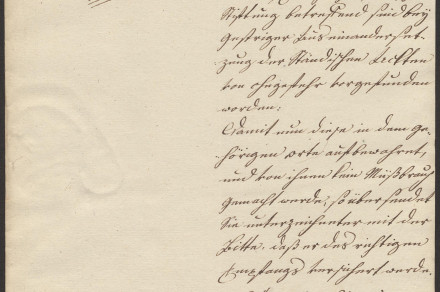
May 2023
The Condition of the Carniolan Provincial Estates' Archive in 1785 According to the Writings of its Archivist Alois Kappus von Pichelstein
In 1783, Alois Kappus von Pichelstein began his work as the archivist at the Carniolan Provincial Estates' archive, the first employee ever to hold this title, and remained at his post until 1788. In the summer of 1785, when Inner Austrian Gubernium in Graz sent for the founding charter of the Flachenfeld's canonry, the Estates' archive was just allocated its first suitable space, and its archival documents were due to numerous moving around in considerable state of disarray. Kappus set about arranging the collection of archival documents and was only able to find the missing charter at the start of December 1785. He immmediately sent it to Graz, and, apologizing for the delay, described his efforts in arranging and processing the Estates' archive.
-
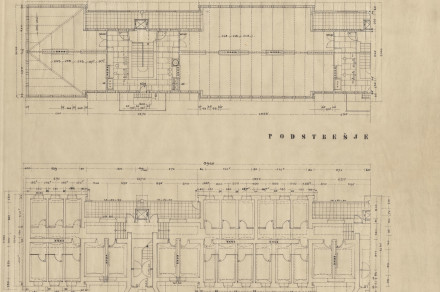
June 2023
Floor Plans and Details by Edvard Ravnikar for his Block of Flats in Nova Gorica
This year marks the 30th anniversary of the death of Edvard Ravnikar. Upon the initiative of the Ministry of Culture, the Government of the Republic of Slovenia has designated 2023 as the Year of Edvard Ravnikar, in celebration of his extensive architectural opus. Experts in the field of architecture and art history rank Ravnikar among the most important architects in Slovenia, and his creations have become an indispensable part of the Slovenian cultural heritage. One of his first post-war commissions was the making of the plans for the blocks of flats in Nova Gorica. Presented here as this month's archivalia are the floor plans and details on windows and doors of such a block of flats in Nova Gorica.
-
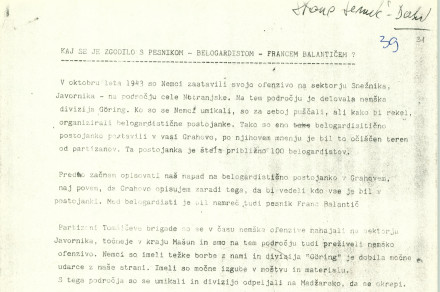
July 2023
»Kajuh Did Everything to Save Balantič, but Balantič Did Not Want to Hear Him Out …«
Commemorating the Year of Karel Destovnik – Kajuh, this month's archivalia presents a memoir record of Stane Semič about the meeting of Karel Destovnik and France Balantič during the time the Home Guard post in Grahovo was attacked and destroyed in November 1943. The document offers some intriguing information, which upon close critical inspection appears to be highly improbable. Instead, the document demonstrates the importance of critical study of archival sources and the lack of reliability of memoirs as a source of historical studies.
-
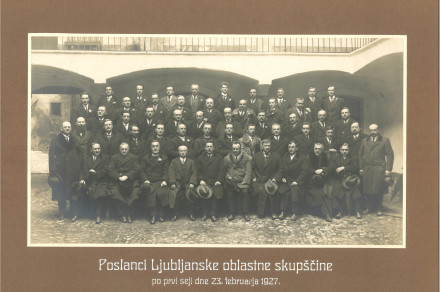
August 2023
A Photograph of the Members of the Ljubljana Oblast Assembly Taken After Its First Session
In the new Yugoslav state of the Kingdom of Serbs, Croats and Slovenes, the so-called oblasts (administrative regions), which were to operate as the largest administrative and self-governing units in their respective territories, were established with the Vidovdan Constitution of June 1921. The constitution also stipulated the elections for the assemblies of each oblast. Assemblies of the Ljubljana and Maribor Oblasts had 107 representatives elected from 30 Slovenian districts and towns. Presented here as this month’s archivalia is a photograph of the members of the Oblast of Ljubljana assembly, which was taken after the assembly’s first session on February 23, 1927.
-
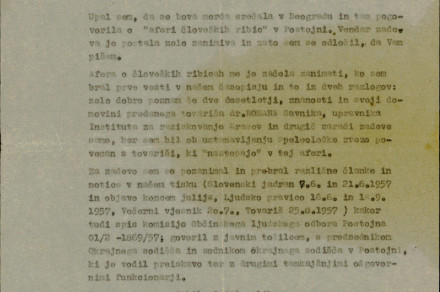
September 2023
The Olms from Postojna Cave in Germany: Stolen or Donated?
Although the underground waters of Hermann's Cave are now a home to seven olms, which today are considered to be the cave's main attraction, these aquatic salamanders actually originate from Postojna Cave and were only introduced to their new habitat in Hermann's Cave artificially. At the end of 1956, the removal of thirteen olms from Postojna Cave caused a major scandal that reverberated across the former Yugoslavia and the East and West Germany. Some of the preserved archival records on this story is presented here as this month's archivalia.
-
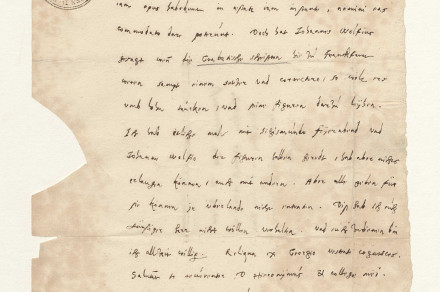
October 2023
The 1568 Letter by Hartmann Beyer to Primož Trubar
Among the preserved records of the Carniolan Provincial Estates in the registrature fascicle 54 one can also find letters written by Primož Trubar and several other Protestants of the province of Carniola. The majority of these letters were in their original form and in the Slovenian translation published by Jože Rajhman, but he included mostly letters written by the prominent Carniolan Protestants and omitted the correspondence of foreign Protestants. One of such unpublished letters is presented here as this month’s archivalia.
-
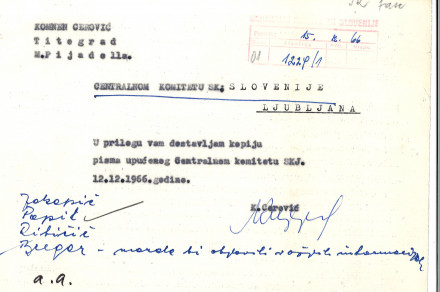
November 2023
Reactions to the Đilas Affair in Yugoslavia and Abroad
This month's archivalia is a letter written by the Montenegrin partisan and national hero Komnen Cerović (1916-2000) and sent at the end of 1966 to the Central Committee of the League of Communists of Yugoslavia. In his letter he is asking why Milovan Đilas (1911-1995) was still in prison. The archivalia describes how Đilas went from being a member of the Party's innermost circle to being a first-class persona non-grata virtually overnight.
-
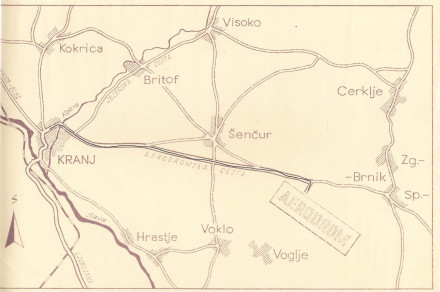
December 2023
December 2023 marks the 60th anniversity of the opening of the Ljubljana airport at Brnik. Presented here as this month's archivalia are some of the "protocol" documents (invitation, guest list, programme of and report on the opening), which take us back to the time when the first stage of the construction of the new airport was completed and the airport was the scene of its first passenger plane landing.


